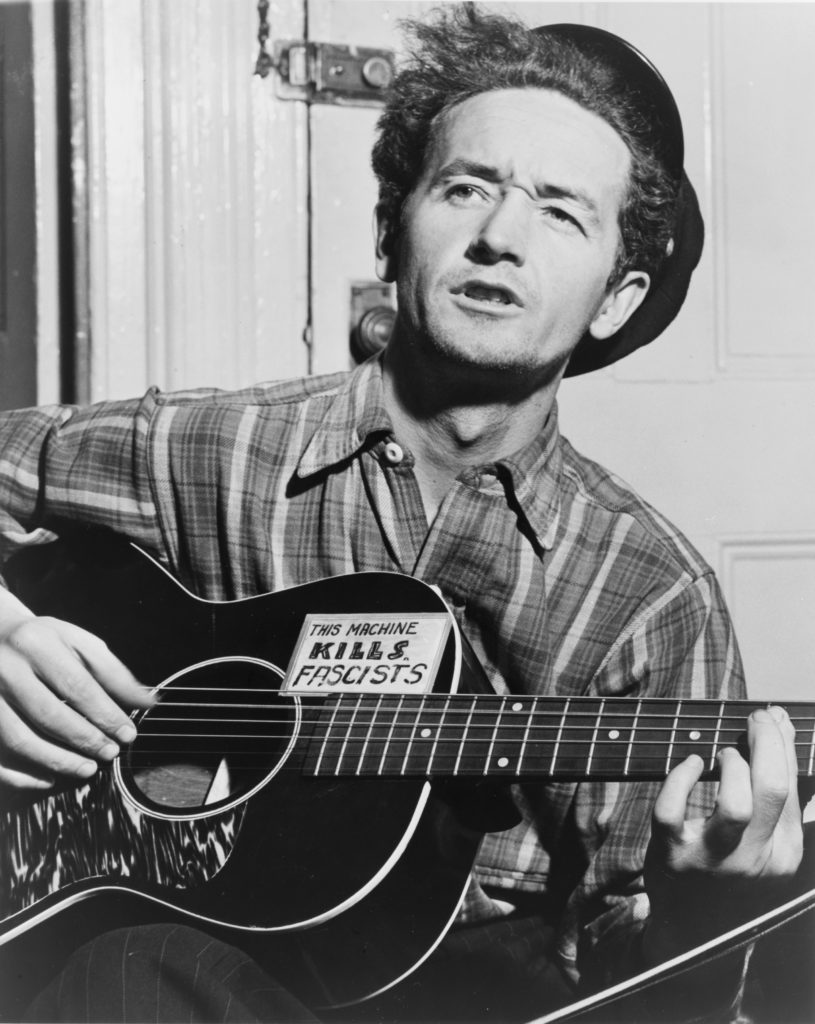 The Klezmatics will
perform Hanukkah songs by Woody Guthrie. Photo by Adrian Buckmaster.
The Klezmatics will
perform Hanukkah songs by Woody Guthrie. Photo by Adrian Buckmaster. The Klezmatics are rolling into Southern California once again to celebrate Yiddish culture as well as to perform festive Hanukkah songs penned by American folk legend Woody Guthrie. In what has become a seasonal favorite, the iconic New York City-based neo-klezmer troupe will perform songs from its two albums of Guthrie originals and other traditional holiday fare on Dec. 16 at the Valley Performing Arts Center in Northridge.
In their more than 30 years as a band, the Klezmatics have become the standard-bearers for Eastern European Jewish music, while bringing in other influences like Latin, Celtic, Afro-Caribbean and folk music. They are largely credited with helping to revive interest in Yiddish music and culture among a younger audience by drawing on the musical legacy and social activism of turn-of-the-century Jewish immigrants.
So, how did Guthrie, the non-Jewish Dust Bowl balladeer from Oklahoma and writer of “This Land Is Your Land,” come to write songs for Hanukkah?
The father of American folk music became involved with the Jewish community at Coney Island soon after he moved to Brooklyn in 1942. His third wife, Marjorie Mazia, was born Marjorie Greenblatt and was a dancer in the Martha Graham Dance Company. Marjorie’s mother, Aliza Greenblatt, was a well-known Yiddish poet and an early, committed leader in Zionist and Jewish women’s organizations. Many of her poems also were set to music and recorded by artists such as Theodore Bikel.
“We’ve drawn a lot of material from these great Yiddish socialist traditions.” — Frank London
Guthrie had a unique working relationship with his mother-in-law, who lived across the street and served Friday night Shabbat dinners to the family. They bonded over a shared love of culture and social justice, and she likely inspired him to write a batch of Hanukkah songs in 1949 for parties at the local Jewish community center. The songs are a combination of children’s tunes and more serious ballads about Jewish history and spiritual life.
In “The Many and the Few,” Guthrie recounts the life stories of key characters in Jewish history, including King Cyrus, Alexander the Great and Judah Maccabee. The Maccabee song ends with the lyrics: “Eight candles we’ll burn and a Ninth one too / Every new year that comes and goes / We’ll think of the many in the hands of the few / And thank God we are seeds of the Jews.”
Some of the songs are sentimental, like “Hanukkah’s Flame,” in which Guthrie writes: “Now as I light my first and my last / Of all nine candles to guide you past / Through these winds of blowing snows / To take you to your Hanukkah home.”

Others are playful, such as “Hanukkah Dance” (“Tippy tap toe! Happy Hanukkah! / Round you go! My little latke!”) and “Honeyky Hanukkah” (“It’s Honeyky Hanukkah, brushy my hair / Let’s dance a big horah and jump in the air.”)
The songs were never set to music and, after Guthrie’s death in 1967, sat untouched for decades. That is, until Nora Guthrie (Woody’s daughter and Arlo Guthrie’s sister) discovered a box of her father’s unpublished lyrics and poems. She approached the Klezmatics in 1998, after their concert at Tanglewood with violinist Itzhak Perlman, told them about her father’s collection of Jewish songs, and invited the band to record them.
The songs became the basis for The Klezmatics’ 2006 album “Happy Joyous Hanukkah.” Frank London and his bandmates set the words to melodies, a melding of Yiddish nigunim (traditional Chasidic melodies), folk, bluegrass and gospel arrangements.
Another set of Guthrie’s lyrics, which were anti-fascist and pro-labor, ended up on the Klezmatics’ 2006 Grammy Award-winning world music album, “Wonder Wheel.”
“If you look at ‘Wonder Wheel,’ it’s Jewish-y but in a more oblique way,” London said. “We do the material from ‘Wonder Wheel’ all year round in our concerts, but the Hanukkah material is for now.”
London, who sings and plays trumpet and keyboards, is one of three original members still on board, along with Lorin Sklamberg (lead vocals, accordion, guitar, piano) and Paul Morrissett (bass, tsimbl). The ensemble also includes longtime members Matt Darriau and Lisa Gutkin.
The Klezmatics generally sing in Yiddish, though the two Guthrie albums are in English. But London said Guthrie did occasionally drop Yiddish words into his songs.
“A knish. … Calling a girl a meydeleh,” London said. “[Guthrie] didn’t speak or write in Yiddish. But it’s kind of cute that Woody Guthrie, the guy that wrote ‘Grand Coulee Dam,’ is dropping words like blintz.”
The Klezmatics are known as outspoken human rights advocates and have long been influenced by the radical socialist history of Yiddish poetry and music.
“We’ve drawn a lot of material from these great Yiddish socialist traditions,” London said. “Yiddish culture is filled with respect and love for basic human dignity, and Woody’s music likewise.”
As America once again grapples with rising anti-Semitism, fascism and a restructuring of society to benefit the wealthy, London says Guthrie’s songs will resonate with audience members.
“This is a very difficult time we live in,” he said. “And I believe that one of the good aspects of music and the music the Klezmatics make, whether we’re doing our more political stuff or not, is that having people come together and sing together … will give people the strength to do the work necessary to resist some of the horrors of our contemporary moment.”
The Klezmatics will perform at 8 p.m. Dec. 16 at the Valley Performing Arts Center in Northridge. Tickets for “Happy Joyous Hanukkah” start at $33 and can be purchased by calling (818) 677-3000 or visiting valleyperformingartscenter.org.




















 More news and opinions than at a Shabbat dinner, right in your inbox.
More news and opinions than at a Shabbat dinner, right in your inbox.